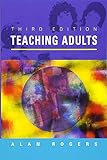Teaching adults / Alan Rogers.
Material type: TextPublication details: Buckingham : Open University Press, 2002.Edition: 3rd edDescription: viii, 296 p. : ill. ; 23 cmISBN:
TextPublication details: Buckingham : Open University Press, 2002.Edition: 3rd edDescription: viii, 296 p. : ill. ; 23 cmISBN: - 9780335210992 (pbk.) :
- 0335210996(pbk.)
- 374 ROG
- LC5215 .R58 2002
| Item type | Current library | Call number | Copy number | Status | Date due | Barcode | |
|---|---|---|---|---|---|---|---|
| Long Loan | TUS: Midlands, Main Library Athlone General Lending | 374 ROG (Browse shelf(Opens below)) | 1 | In transit from Selfcheck to TUS: Midlands, Main Library since 30/11/2019 | 00211848 | ||
| Long Loan | TUS: Midlands, Main Library Athlone General Lending | 374 ROG (Browse shelf(Opens below)) | 1 | Available | 206497 | ||
| Long Loan | TUS: Midlands, Main Library Athlone Nursing Collection | 374 ROG (Browse shelf(Opens below)) | 1 | Available | 200244 | ||
| Long Loan | TUS: Midlands, Main Library Athlone Nursing Collection | 374 ROG (Browse shelf(Opens below)) | 1 | Available | 200249 |
Previous ed.: 1996.
Includes bibliographical references (p. 286-293) and index.
INTRODUCTION: From certainty to uncertainty--From deficit to diversity--Modes of adult education--From adult education to lifelong learning--Why lifelong learning now?--BEFORE YOU START--1. A CONTRACT TO LEARN:- Teaching adults: a world of difference--Agreeing to learn together--The information provided--Creating the contract--2. DEFINITIONS:- ~The search for understanding: adult education--Adult--Education--Adult education--3. ADULT STUDENTS:- Student profiles--Lifespan studies--General characteristics of adult student-learners--Implications for the teacher of adults--4. THE NATURE OF LEARNING:- Learning and change--Learner-based theories--Intelligence and the brain--Behaviourist theories--Cognitive theories--Personality theories--Humanist theories--Experiential learning--Motivation and learning--The context of motivation--Critique of learner-based theories--Context-based theories--Knowledge-based theories--Process-based theories--Critical reflection on experience--Constructivism--Diversity of ways of learning--5. FROM LEARNING TO TEACHING:- Learning and life--Natural learning--Learning episodes--Two different kinds of learning--Acquisition and formalised learning--The uniqueness of adult learning--From learning to teaching--Building on learning--Is adult teaching different?--PAUSE FOR THOUGHT: 6. Goals and objectives:- Aims, goals and objectives--Setting the goals--The value and limitations of behavioural objectives--Widening the goals--7. THE ADULT LEARNING GROUP:-The importance of groups in adult learning programmes--What is a group?-- Group structures--Groups in adult education--Note: killing the group--8. ROLES AND THE TEACHER:- Roles and changing roles--Group roles--The roles of the teacher of adults--Resistance to change---Conclusion--9. TEACHING: CONTENT AND METHODS:-Curriculum--Content and methods--Content--Methods--Teaching--Note: Facing some problems in an adult learning group--PAUSE FOR MORE THOUGHT: 10. BLOCKS TO LEARNING:- Identifying the problem--Pre-existing knowledge--Self-perception factors--Conclusion--11. EVALUATION:- The need for evaluation--Who evaluates?-- Evaluate what?--Evaluation methods--12. PARTICIPATION:-Participation as involvement in the process (active learning)--Participation as increasing control over the process--Participation as presence in teaching-learning programmes--Conclusion: the learning and teaching of adults.
'Teaching Adults' is a comprehensive account of the major issues faced by teachers of adults. It discusses basic principles, and also provides hints and tips for teachers.
